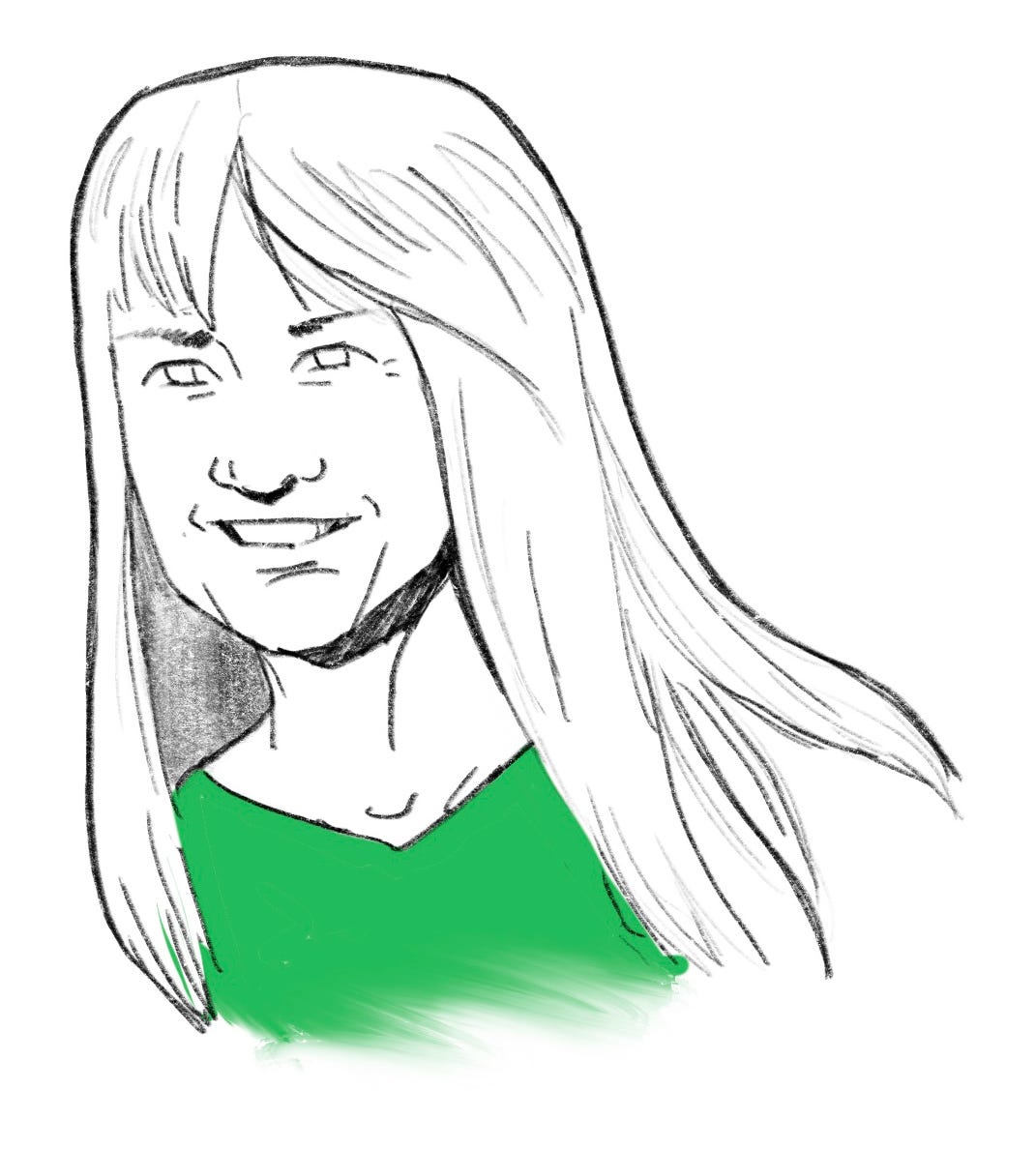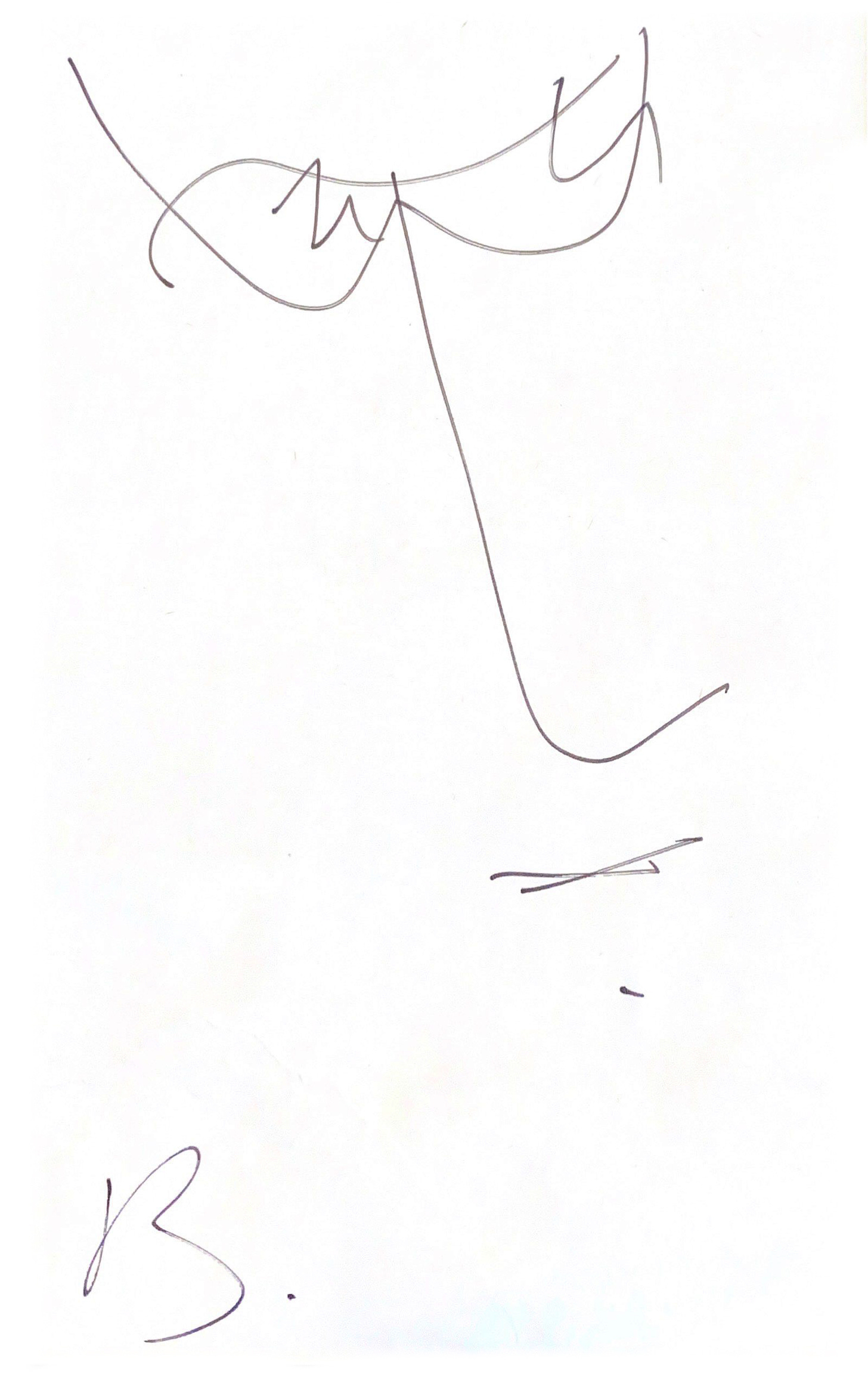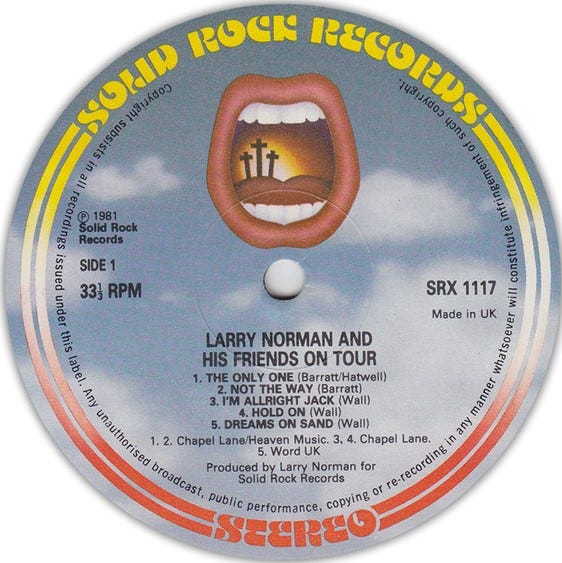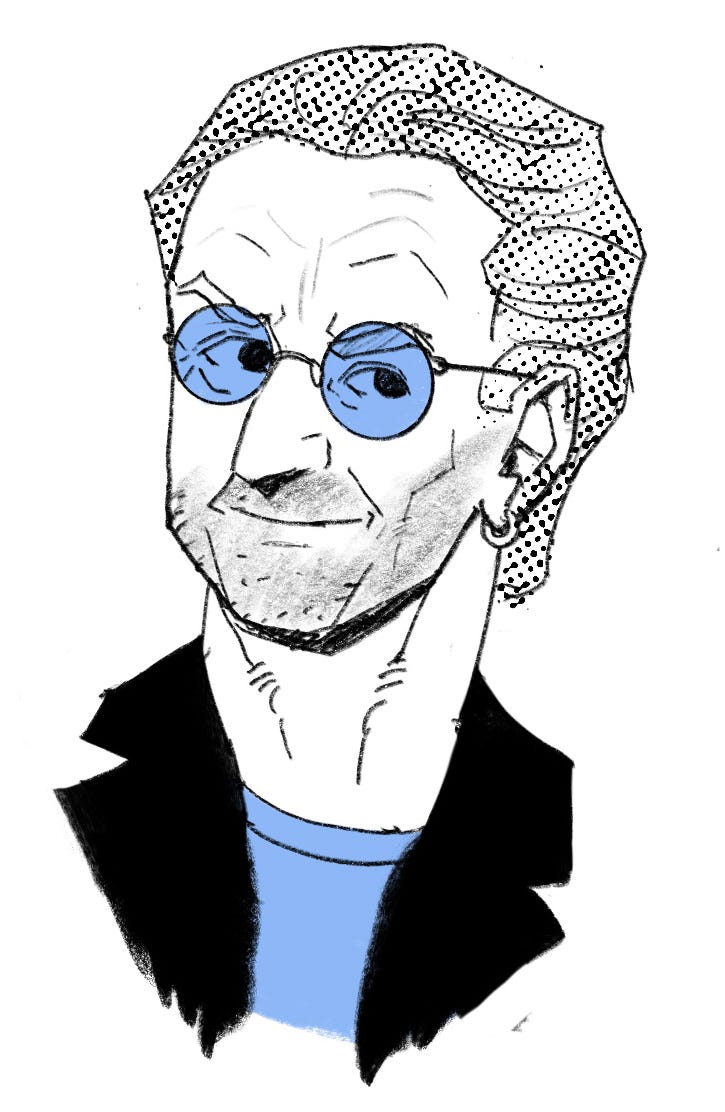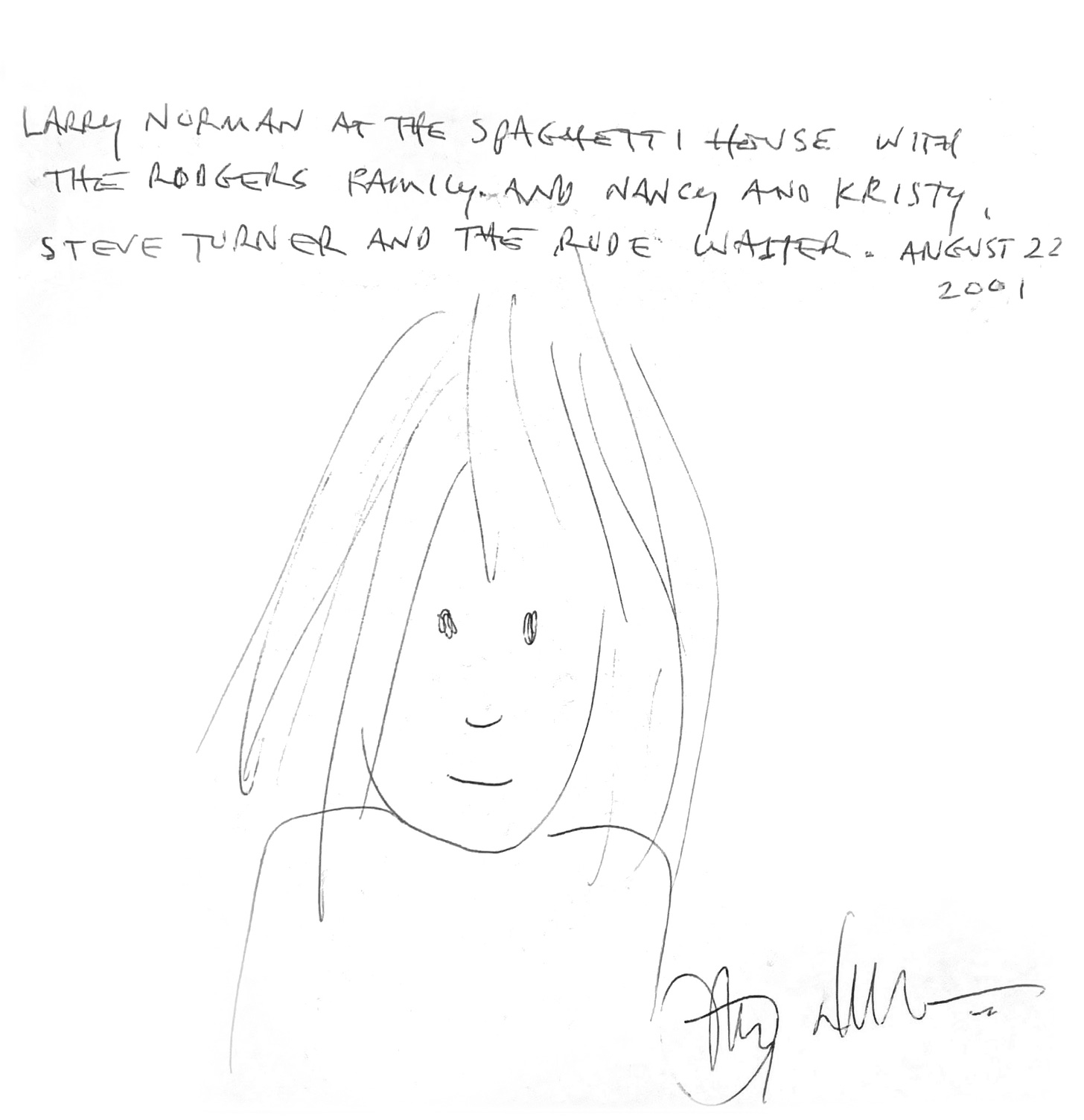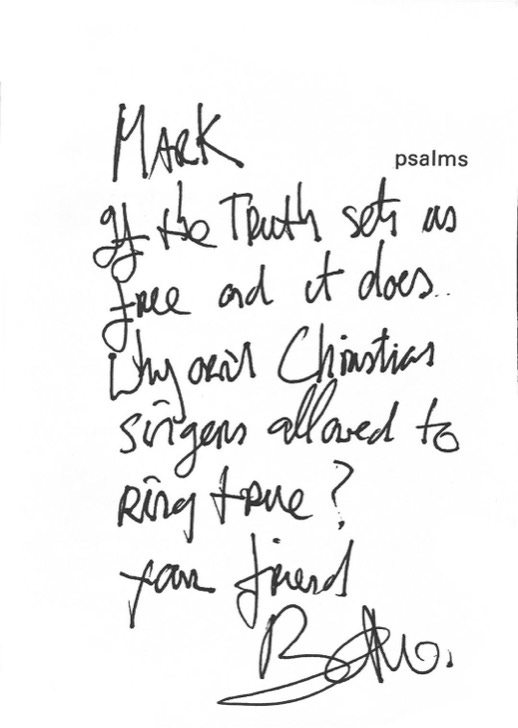Larry Norman; Why Should the Devil Have All the Good Music
Our first mini-comic following the story of Christian Rock n' Roll pioneer, Larry Norman.
“Some people say rock 'n roll is of the devil, I don't believe that
It came from the church, belongs to the church
There's a good world that God has created here, He's given us everything
The devil has tried to steal it
I don't know why the devil should have anything, anything
Not your soul, not your life, not your marriage, not your future, not your music”
— Larry Norman from song “Why Should the Devil Have All the Good Music?”
Larry Norman was an influence on my life (unbeknownst to me at the time) as well as virtually every artist in today’s Christian music scene, and someone who later became a friend.
Larry Norman, Illustrated by Wade McComas
Larry was perhaps the first Christian rock and roll musician. A child of his age, in the early 1970’s he wrote not just of his faith, but of the injustices and abuses of his day, offering hope to a generation disappointed by the false promises of the “Tune In, Turn On, Drop Out” cultural priests like Timothy Leary. He challenged the drug culture, and lamented the loss of fellow artists like Janis Joplin, Jimi Hendrix and Jim Morrison. But he also challenged the failures and hypocrisy of the Christian church that he had been raised up in:
You kill a black man at midnight just for talking to your daughter,
Then you make his wife your mistress and you leave her without water;
And the sheet you wear upon your face is the sheet your children sleep on,
At every meal you say a prayer; you don't believe but still you keep on.
Larry had to push against every convention at the time to pursue his clear calling. The church didn’t want long-haired hippies, rock and roll or bare feet in its pews. Rock and roll wasn’t ready for a preacher, a prophet and a provocateur. Larry didn’t want to be boxed in by either, but break out of both. He wrote about this in a liner note essay for his 1976 album In Another Land as an apologetic for accommodating our culture without compromising to be accepted by it.
Living as salt and light in Babylon. With permission from his family, we decided to launch our story series by illustrating Larry’s essay as an example of a saint wrestling with the tensions of accommodating the culture without compromising to it.
Although he was never fully accepted in mainline or evangelical church culture, with his butt-length white hair and confrontational lyrics and end-times focus, he opened the door for a generation of artists that continue in his wake today.
In 2000, I met one of those artists, Bono from U2. I had listened to the band throughout my college years (Boy/1980, October/1981, War/1983 and Unforgettable Fire/1984) and from a faith journey perspective they helped form me, perfectly infusing faith with their lyrics and social justice concerns.
Drawing of Bono by Bono
I was working on Capitol Hill as Rick Santorum’s Chief of Staff, and had the opportunity to engage Bono’s team on the Jubilee 2000 effort to promote debt forgiveness, and eventually working with them and the Bush Administration to address the global AIDS emergency.
This is where the streams of story come together.
In an elevator ride with Bono, I asked about Larry’s lyrics for the song “God Part III” from Stranded in Babylon (1991) in relation to his own in “God Part II” from Rattle and Hum (1988). It was not clear to me that Bono was aware of Larry’s version, and possibly not even aware of Larry. I had another meeting scheduled with Bono a few days later in the Capitol before a concert in DC that night, and was determined to get him a copy of Larry’s CD. I called his label, Solid Rock Records, located in Oregon, to get a copy sent overnight. My call back from Larry himself offering to bring it in person caught me a bit off guard, but I gladly accepted.
He never showed. Larry and his son were stuck on the tarmac in St. Louis, missing the meeting and the concert. Bono set aside tickets for them, but they didn’t meet. When Leanne got home the next night from a conference she found Larry at our dining room table with his green-spiked hair son, Mike, and we took them the next morning to meet with some DC influencers at Bilbo Baggins restaurant in Old Town Alexandria, decorated in 1977 Rankin-Bass The Hobbit animated film style. One of my greatest regrets with an artist was not asking Larry to play a song there (he had brought his guitar to Bilbo’s with him). I never heard him play live.
We talked art, faith and poetry together, and the conversation helped birth the idea to connect Bono to other Christian artists to raise awareness of the growing AIDS crisis, as well as to support the Bush Administration’s historic effort to combat it. (You can see more about this effort in a short doc we produced for the 15th anniversary of PEPFAR.) We also discovered that we would be in the UK a few months later at the same time, in the same city and the same night that both he and U2 would be performing there. We agreed to try to connect the streams together again.
On the back of Larry’s official UK tour tee-shirt was a faux schedule; along with “Have tea with the Queen” was “See U2 with the Rodgers Family.” Larry’s show started early that night but would go late (he didn’t know that two opening acts were booked), so we ended up only taking his two sisters with us to U2. As we walked from behind the stage into the venue, late, Bono was a few feet above us, quoting Psalm 116 from Eugene Peterson's translation The Message:
“What can I give back to God for the blessings he's poured out on me? I'll lift high the cup of salvation -- A toast to God!”
Bono, Illustrated by Wade McComas
But this was not the end of the story. Larry’s tour tee-shirt also revealed that he and we would be in London the same night a few days later, which just happened to be the last night of U2’s tour in the UK.
We secured a final set of tickets for Larry to go with a mutual friend of his and Bono’s, the writer, journalist and poet Steve Turner. Our plans were to have Jack Heaslip, U2’s pastor, join us together for dinner before the show, but sadly Bono’s father had just passed away, and Jack had flown back to prepare for the funeral.
On the day of the concert, and our last day in the UK, we were walking near Piccadilly Circus as a family and stopped at an outdoor restaurant for a quick bite. To our chagrin, in ALL of London Larry was seated unexpectedly, and uninvited, next to us. The odds were infinitesimally small, and the chance meeting could only be counted as a Providential one, a reminder of God’s attention to the small details of our lives which Larry needed at that moment.
Drawing of Larry, by Larry
That evening at dinner (with a rude waiter) Larry announced that he wasn’t feeling well, and was inclined to take a pass on the concert. Steve convinced him otherwise, but Larry’s health was more dire than we realized. Larry had a heart attack after returning to the US, and was never able to fully play again.
But that still wasn’t the end of the story. In 2004, Larry emailed me that Bono would be nearby in Portland and with typical Lucy-long suffering, she arranged a meeting between them, which would turn out to be their first and only. Larry emailed me later:
“It seemed like we spent ten or fifteen minutes talking and having our photos taken. In one of the last photos he put his arm around me and out of the corner of my eye I saw that he stretched up taller, on his toes. I remembered a line from The Beatles movie, Hard Day’s Night, and said, “Stop being taller than me.” He said, “Well, I don’t get the chance very often,” and laughed. His staff was very sweet, very kind … I’m used to Christians performing their faith like it was meant to be witnessed from the outside. They want to be seen in their Christianity, with their Christian aura, Christian cloak. But there is nothing personal with many of those Christians I meet. Of course, because I’m Larry Norman, I’m not sure if they’re being themselves or if they’re incapacitated by propinquity. But I suspect that they think being a Christian is something you do, not something you are. So it was a relief to feel Bono’s spiritual pacificity and his openness and warmth. He’s a real man, not a poseur.”
Larry, like Bono and the rest of us, was part sinner and part saint. It’s what made him the Outlaw that he was … pushing against the church and the world at the same time. But there was a hunger for Jesus and love for others that drove him until the end, when he passed away in 2008 at 60. It was this courage to break conventions and pioneer paths to share good news to a broken world that has inspired us at Clapham and why we chose his own words to be illustrated as a mini-comic to be our first saint’s “salt and light story.”
I think the takeaway from Larry’s saint story is summed up well by a note that Bono wrote in a “pocket canon” of the Book of Psalms:
“If the truth sets us free..and it does..why aren’t Christian singers allowed to ring true?”
PS: Bono let me know that “God Part II” was his take on John Lennon’s song God, in which Lennon suggests God is just a concept. We are thankful at Clapham that we have been permitted to pursue a mix of faith, culture and social action to seek the flourishing of the city in which we have been invited to live, while we are Stranded in Babylon (the album on which is Larry’s take “God Part III”) until the very last day.
You can visit the Solid Rock Records store here.
Read the first two pages of our Larry Norman mini-comic here.
Mark Rodgers





